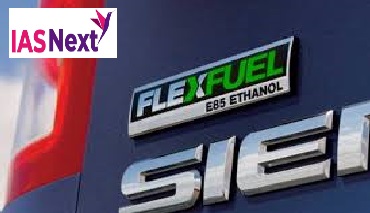CURRENT AFFAIRS
Get the most updated and recent current affair content on Padhaikaro.com
What are Flex Fuel Vehicles?
- IAS NEXT, Lucknow
- 27, Dec 2021

Reference News:-
Union Minister of Road Transport and Highways, Nitin Gadkari, has for long been advocating the use of flex-fuel to power cars and motorcycles sold in India.
- Recently, at an industry event, the transport minister revealed that he has issued an advisory to all carmakers to introduce flex-fuel engines in their vehicles.
As per the advisory issued by the government:
- Carmakers are given six months’ time to introduce flex-fuel engines.
- Manufacturers have to produce the Flex Fuel Strong Hybrid vehicles and both types of vehicles must comply with the BS-6 emission norms.
What are flexible fuel vehicles (FFVs)?
An FFV is a modified version of vehicles that could run both on gasoline and doped petrol with different levels of ethanol blends.
- FFVs will allow vehicles to use all the blends and also run on unblended fuel.
- FFVs have compatible engines to run on more than 84 percent ethanol blended petrol.
Benefits:
- FFVs are aimed at reducing the use of polluting fossil fuels and cutting down harmful emissions.
- Alternative fuel ethanol is Rs 60-62 per litre while petrol costs more than Rs 100 per litre in many parts of the country, so by using ethanol, Indians will save Rs 30-35 per litre.
- For India, FFVs will present a different advantage as they will allow vehicles to use different blends of ethanol mixed petrol available in different parts of the country.
- Also, these vehicles are a logical extension of the Ethanol Blended Petrol (EBP) programme launched by the Union Ministry of Petroleum and Natural Gas in January 2003.
- Since India has surplus produce of corn, sugar and wheat, the mandatory blending of ethanol programme will help farmers in realising higher incomes.
- For the overall Indian economy, higher usage of ethanol as an automobile fuel will help save import costs as the country meets more than 80 per cent of its crude oil requirements through imports.
Disadvantages/challenges of using FFVs:
- Customer acceptance will be a major challenge since the cost of ownership and running cost are going to be very high compared with 100 per cent petrol vehicles.
- Running cost (due to lower fuel efficiency) will be higher by more than 30 per cent when run with 100 per cent ethanol (E100).
- Flex Fuel Engines cost more as ethanol has very different chemical properties than petrol. Ethanol has very low (40 per cent) Calorific value as compared to Gasoline, very High Latent heat of vaporization causing cooling of charge/combustion etc.
- Ethanol also acts as a solvent and could wipe out the protective oil film inside the engine thereby could cause wear and tear.